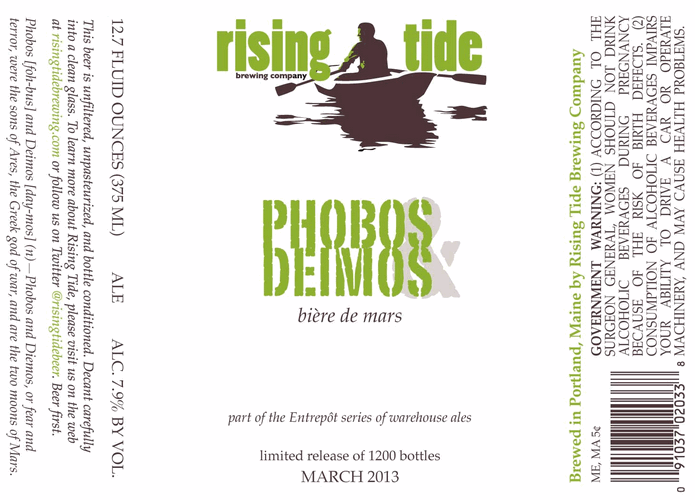On the Sunday afternoon of the slush storm, after the snowblower had become jammed with soft ice, son-in-law Christian showed up with a half-full growler of Oxbow Loretta and a 750-milliliter bottle of the brewery’s Barrel Aged Farmhouse Pale Ale.
Christian, son Zachary and I finished the shoveling by hand, went inside to celebrate granddaughter Maeve’s birthday, and very much enjoyed these two beers as a treat.
I have never been to Oxbow’s brewery in Newcastle, an omission I vow to correct within the next few months, but Christian had stopped with some friends on the way back from Rockland. He found the staff friendly, the beers great and the entire experience enjoyable.
The Oxbow website says Loretta is “available in summer,” which made me think they are marketing it as a summer beer, even though it was available in February. At 4 percent alcohol, it would quench your thirst in hot weather or after hard work.
It poured cloudy, and had a small head. It was lightly carbonated, but that could have been because the growler had been opened the night before. It is made with spelt, a type of wheat, grown on a horse farm in Pittston.
Oxbow says this beer is a grisette, which is brewed to be given to coal miners as they come out of the mines after their shift. There was a strong flavor of wheat and yeast, and the beer worked very well as a thirst quencher after shoveling slush. It also would be good after summer chores.
The Barrel Aged Farmhouse Pale Ale is a more complex beer designed for relaxing. I had a cask-conditioned version of this beer for the first time in late 2011, when the Great Lost Bear held an Oxbow night shortly after the brewery opened.
The bottled beer was more carbonated than the one I had at the Bear, but cask-conditioned beers usually have less carbonation than bottle-conditioned versions. The beer had a little bit of fruit, vanilla and oak to go along with the funk from the brettanomyces yeast.
This is the fourth batch of this beer that Oxbow has made, and is the largest at 400 bottles. Brewer Tim Adams, who changes the yeast a little with each batch, has switched the type of barrels used and the time in the barrels.
It was a truly enjoyable beer.
WIFE NANCY AND I split a bottle of Rising Tide’s Phobos & Deimos on Saturday night, and both of us enjoyed it a lot. It is part of the brewery’s Entrepot series of beers, which are the brewery’s small-batch experiments.
Phobos & Deimos is unfiltered, unpasteurized and bottle-conditioned. It’s a smooth, easy-drinking beer despite its 7.9 percent alcohol content, and has a fruity hop flavor with yeast, wheat and malt in the background.
The beer is the brewery’s tribute to spring (its version of biere de mars, or March beer), and is named after the two moons of Mars and the two sons of Aires: Fear and terror.
Traditional March beers, brewed in the Wallonia section of Belgium, would be much lower in alcohol than this and made from the second runnings of the malt. But the flavor is right for the style.
Nancy and I questioned the pricing. At $8.50 for a 375-milliliter (12.7-ounce) beer, it is fairly expensive. But it is a hand-crafted, limited edition beer of only 1,200 bottles, and is in the same range ounce for ounce as Allagash Curieux and similar beers. So if you think of it as a special-occasion drink like fine wine, it isn’t bad.
ON A LIGHTER NOTE, we also bought a six-pack of New Albion Ale, Boston Beer Co.’s reproduction of Jack McAuliffe’s original craft beer brewed in 1976 in Sonoma, Calif. The six-pack cost $8.99.
Boston Beer founder Jim Koch brought McAuliffe to the Samuel Adams Boston to re-create this beer, which had not been brewed in more than 30 years.
New Albion is less flavorful than almost any craft beer now on the market, but it is still enjoyable. It has a sweet maltiness and a good hops character, and must have been fairly high in alcohol for its time at 6 percent.
If it weren’t for the historic nature of this beer, it probably would not be noticed in today’s market. But when I think about what I was drinking in 1976 — a few imports along with such American beers as Schlitz and Narragansett — this would have been an amazing find.
Tom Atwell is a freelance writer living in Cape Elizabeth. He can be contacted at 767-2297 or at:
tomatwell@me.com
Send questions/comments to the editors.



Success. Please wait for the page to reload. If the page does not reload within 5 seconds, please refresh the page.
Enter your email and password to access comments.
Hi, to comment on stories you must . This profile is in addition to your subscription and website login.
Already have a commenting profile? .
Invalid username/password.
Please check your email to confirm and complete your registration.
Only subscribers are eligible to post comments. Please subscribe or login first for digital access. Here’s why.
Use the form below to reset your password. When you've submitted your account email, we will send an email with a reset code.